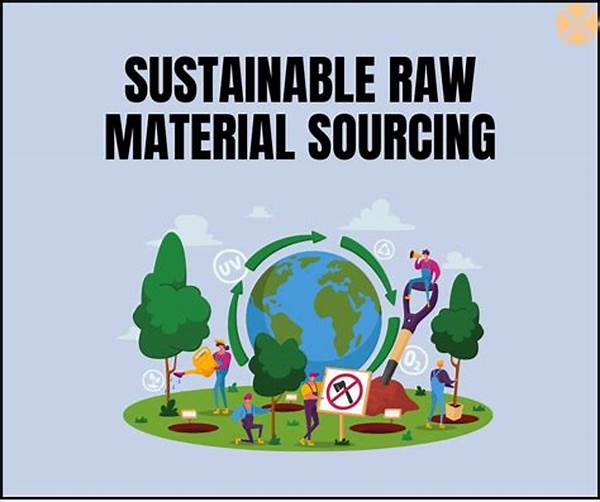In today’s rapidly globalizing world, the choices we make as consumers have far-reaching consequences. More than ever, people are aware of the importance of ethical sourcing of raw materials. These decisions impact not only the environment but also the lives of countless individuals involved in production processes. Companies are beginning to realize that ethical sourcing is not just a noble endeavor—it’s a crucial aspect of sustainable business strategies that can be the difference between gaining or losing consumer trust.
Read Now : Classic And Chic Men’s Attire
The Importance of Ethical Sourcing of Raw Materials
Ethical sourcing of raw materials is about making informed choices that protect the environment and ensure fair working conditions. When businesses prioritize ethical sourcing, they contribute to a healthier planet and promote positive social and economic impacts in communities where raw materials are sourced. This approach not only satisfies the demands of increasingly discerning customers but also reduces risks associated with scandals or consumer backlash. Companies committed to ethical sourcing often see enhanced brand loyalty, leading to stronger market positions. Therefore, it becomes essential for businesses to embrace ethical sourcing as a way to foster commitment to corporate social responsibility while also reaping long-term economic benefits.
Benefits of Ethical Sourcing of Raw Materials
1. Ethical sourcing of raw materials ensures environmental sustainability by promoting the use of renewable resources and minimizing ecological damage.
2. It provides better working conditions and fair wages, improving the quality of life for workers involved in the supply chain.
3. Ethical sourcing strengthens brand loyalty as consumers prefer companies with transparent and responsible practices.
4. It reduces the risk of supply chain disruptions by building stronger, more reliable partnerships grounded in mutual respect and fairness.
5. Ethical sourcing contributes to long-term economic advantages by meeting the growing demand for responsibly produced goods.
Challenges in Ethical Sourcing of Raw Materials
Ethical sourcing of raw materials is not without its challenges. Many companies face obstacles in tracing the origins of their raw materials, ensuring compliance with ethical standards, and dealing with the complexities of global supply chains. Despite these challenges, the commitment to ethical sourcing is crucial. By investing in more transparent and traceable supply chains, businesses can overcome these hurdles. Developing robust partnerships with suppliers, setting clear standards, and employing technology for better oversight are vital strategies. Though challenging, the pursuit of ethical sourcing ultimately pays off by fostering trust, improving industry standards, and supporting sustainable growth.
Strategies for Effective Ethical Sourcing of Raw Materials
1. Know Your Suppliers: Building strong relationships with suppliers helps ensure that ethical standards are met consistently.
2. Set Clear Standards: Clearly defined ethical guidelines for sourcing help suppliers understand and meet expectations.
3. Adopt Technology: Implementing technologies for tracking and monitoring raw material origins enhances transparency and compliance.
4. Engage Stakeholders: Involving all stakeholders, including workers and local communities, ensures that ethical sourcing is a shared goal.
Read Now : Inexpensive Eco-conscious Style Choices
5. Regular Audits: Conducting regular audits helps maintain high standards in the supply chain, ensuring ongoing adherence to ethical sourcing practices.
6. Education: Educating consumers about ethical sourcing makes them more likely to support companies committed to ethical practices.
7. Innovation: Embracing innovative methods for sourcing can lead to more sustainable and ethical practices, benefiting the overall industry.
8. Transparency: Openly sharing sourcing practices and successes with consumers builds trust and loyalty.
9. Community Investment: Investing in local communities where raw materials are sourced boosts social and economic development.
10. Long-Term Partnerships: Building long-term relationships with suppliers fosters collaboration and continuous improvement in ethical sourcing.
Ethical Sourcing of Raw Materials and Consumer Impact
Consumers have the power to drive change through their purchasing choices, and ethical sourcing of raw materials plays a pivotal role in this dynamic. When consumers choose products from companies committed to ethical sourcing, they help create a demand for ethical practices that ripple across industries. This consumer pressure encourages more businesses to adopt sustainable practices, thus transforming the market landscape for the better. It is important for consumers to be informed about the products they buy and the impact of their purchases, making ethical sourcing not just a corporate responsibility, but a shared mission.
Building a Sustainable Future with Ethical Sourcing of Raw Materials
The journey toward ethical sourcing of raw materials is an ongoing effort that requires dedication and collaboration among businesses, suppliers, and consumers. By embracing sustainable practices, companies not only enhance their brand reputation but also contribute to a healthier and more equitable world. Ethical sourcing is not merely a trend—it’s an essential component of future-forward businesses that wish to remain relevant and competitive. As more companies and consumers recognize the benefits of ethical sourcing, the global economy can move towards a more sustainable and socially responsible future.
Conclusion: Ethical Sourcing of Raw Materials as a Win-Win Strategy
In conclusion, the ethical sourcing of raw materials is crucial for ensuring a sustainable future. It is not only beneficial for the environment but also brings about positive social changes and economic advantages. Companies that prioritize ethical sourcing will undoubtedly thrive in a marketplace that values integrity, responsibility, and sustainability. As consumers, our choices play a pivotal role in supporting these companies and promoting ethical practices across industries. By championing the ethical sourcing of raw materials, we help build a better future for all.




